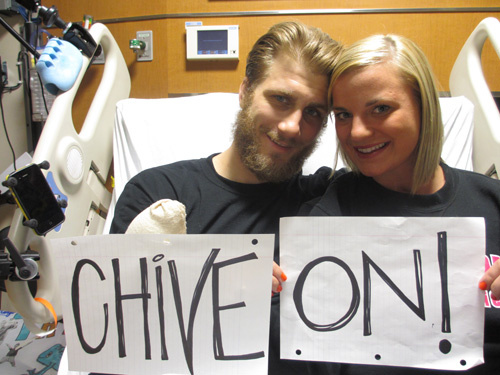The Internet can be a mean place, full of trolls and scamsters. But just like real life, for all the bad, there's a lot of good out there. The Internet can be a positive force.
Science says that we remember bad memories better than good ones. The Dancing Man is definitely a feel-good story about the power of the Internet. As an experiment, I decided to see how many stories I can remember of the Internet's ability to be a force of good, without having to search the web.
But First, The Dancing Man That Started This All
If you haven't already seen this, the Dancing Man started off as a fat shaming exercise on 4chan, a place where you need to know how to deal with arrogant trolls. Here's what the original post looked like:
Unlike the original poster's intention though, the Internet decided to rally around this gentleman and not let him be ridiculed for his weight. An Imgur post led to writer Cassandra Fairbanks tweeting that she and a group of ladies would like to throw him a party where he can dance without inhibition. Soon, #FindDancingMan started trending, as the Internet started looking for the dude. Even celebrities weighed in:
http://twitter.com/thelittleidiot/status/573944025884983296
Sure enough, eventually, this happened:
http://twitter.com/CassandraRules/status/573817848507715585
Fairbanks tweeted that this wasn't her success, it was about the power of numbers that Twitter brought out. There was initially some criticism, about whether Dancing Man wanted to be found or whether this was all someone being over-sensitive about body image issues. We'll let Dancing Man sum up why all that is rubbish:
http://twitter.com/Dancingmanfound/status/573914267570814976
Na na na na Na na na na BATKID!
I wish I could have been in San Francisco on November 15, 2013. After reading this story, you will too.
Miles Scott had been battling leukemia since he was two years old. When he was five, he told the Make-A-Wish foundation that he would like to be Batman's sidekick, Batkid, for a day. A social media agency, Clever Girls Collective, took on the task of making sure Scott would have a memorable day, offering their services for free. Twitter became their batsignal and #batkid was one of the most memorable hashtags of 2013.
Fast Company has a detailed look inside how they made the Batkid campaign go viral:
The stats were impressive: nearly 600,000 tweets and 1.7 billion total Twitter impressions between November 5th and 16th. At its peak traffic time, the Make-a-Wish website received 1,000 hits per second, causing the site to crash.
As November 15 neared, it was decided that San Francisco would be Gotham City for a day. A massive number of people got involved, including the mayor, the local police, and even a guy who offered his lamborghini to be turned into the Batmobile for a day. The San Francisco Chronicle came out with a special Gotham City Chronicle edition. Over 20,000 people turned up to see Batkid get the Key to the City. And well, nothing can top this, right?
http://vine.co/v/htbdjZAPrAX
The power of social networking got a five-year-old kid to feel like a superhero for a day, an incredible number of people volunteered to make him feel special, and the country's President personally thanked him. If that doesn't instill faith in humanity, nothing will. Nothing.
#illridewithyou - How Australia Stood Up To Islamophobia
Great tragedy can divide people and it can unite people. In December 2014, a gunman took hostages in Sydney and asked for a flag of ISIS, the Islamic extremist terrorist organization. Australia had seen several racist attacks before this incident, and some expected a severe reaction against Muslim minorities in the country.
One moving story by an Australian on Facebook started getting shared on social networks:
Inspired by it, Twitter user Sir Tessa suggested others show their solidarity with minorities by offering to walk with them on their daily commute. Soon, people across the nation started tweeting details of their regular commute with the hashtag #illridewithyou. It turned into a trending topic and was much appreciated by Muslims in the nation.
http://twitter.com/OzgeSevindik/status/544454256212717568
Instead of letting the terrorist attack divide country on religious grounds, Australia showed how social networks can band people together in a time of crisis. You can read more about #illridewithyou here.
The Veteran Without Anyone In The World… Or So He Thought, Until His Funeral
There are plenty of people across the world who make it a point to read the obituaries section in the morning newspaper every day. I once made fun of my mom for this morbid routine. Harold Jellicoe Percival should be glad that another mom somewhere was doing the same thing.
Percival died at the age of 99, in a quiet resort in a small town in Lancashire, England. And he had no one to attend his funeral. Until this tweet went out:
http://twitter.com/middleaged_mom/status/398959658310053888
It wasn't just social networking, even the local newspaper of the town was hoping for a better end to a brave life.
The whole story went viral on Twitter, and people promised from far and wide that they would attend. And attend they did:
http://twitter.com/skynewsnorth/status/399851460873052160
http://twitter.com/SteveBeckerHack/status/399847936504651776
So why was this so important to so many people? Why did it catch Twitter's eye and move hundreds to go to a funeral of someone they didn't know? The Guardian spoke to several people at the gathering and one attendant, former soldier Paul Torkington, put it best.
"Nobody should go alone," he says. "Everyone does go alone, ultimately, but someone should be there to witness their passing. This is one of the few useful aspects of social networks."
The Pranksters With Hearts of Gold
The Internet is a huge place, and help can come from the most unexpected corner. If you head to theChive, you'll mostly find photos of scantily clad women, idiotic memes, and pranks like the classic Jenny Quits Her Job on a Dry Erase Board. But back in 2012, theChive and its community did something remarkable.
It all started with a post titled, "Chivers, this is the story of Taylor Morris." Morris was a 23-year-old who defused bombs in war zones. He was in Afghanistan when things went wrong. Morris lost both his hands and his legs in a horrific accident. But he didn't lose his spirit. John Resig, theChive's founder who spoke to Morris after his ordeal, wrote:
After I thanked Taylor for the zillionth time for his service, I hung up the phone and sat in silence recalling our conversation. I was so nervous when we first started chatting but somehow Taylor sets you at ease. He made it ok to ask hard questions about the explosion that nearly killed him and his painful rehab. I recalled something his mother had told me over the phone, "Taylor has a certain humility about his pain, it comforts you." I knew I had just spoken to a hero, not the movie kind either, a real one. And I think he deserves a hero's homecoming.
Social media often helps in fundraising, but Resig decided to leverage his own community to raise money for Morris and his girlfriend Danielle's dream of building a cabin close to the water. He set a goal of $30,000 and asked Chivers to start donating. In four hours, they were at $100,000. The final total? $250,000.
Chive On.
Share Your Favourite Feel-Good Story on the Internet
This isn't an exhaustive list, it's just a bunch of stories that stuck in my memory. Do you remember a time when the Internet made you feel good about the digital world we live in? Go on, share in the comments and put a smile on people's faces. Remember, even comments can be a force of good.





